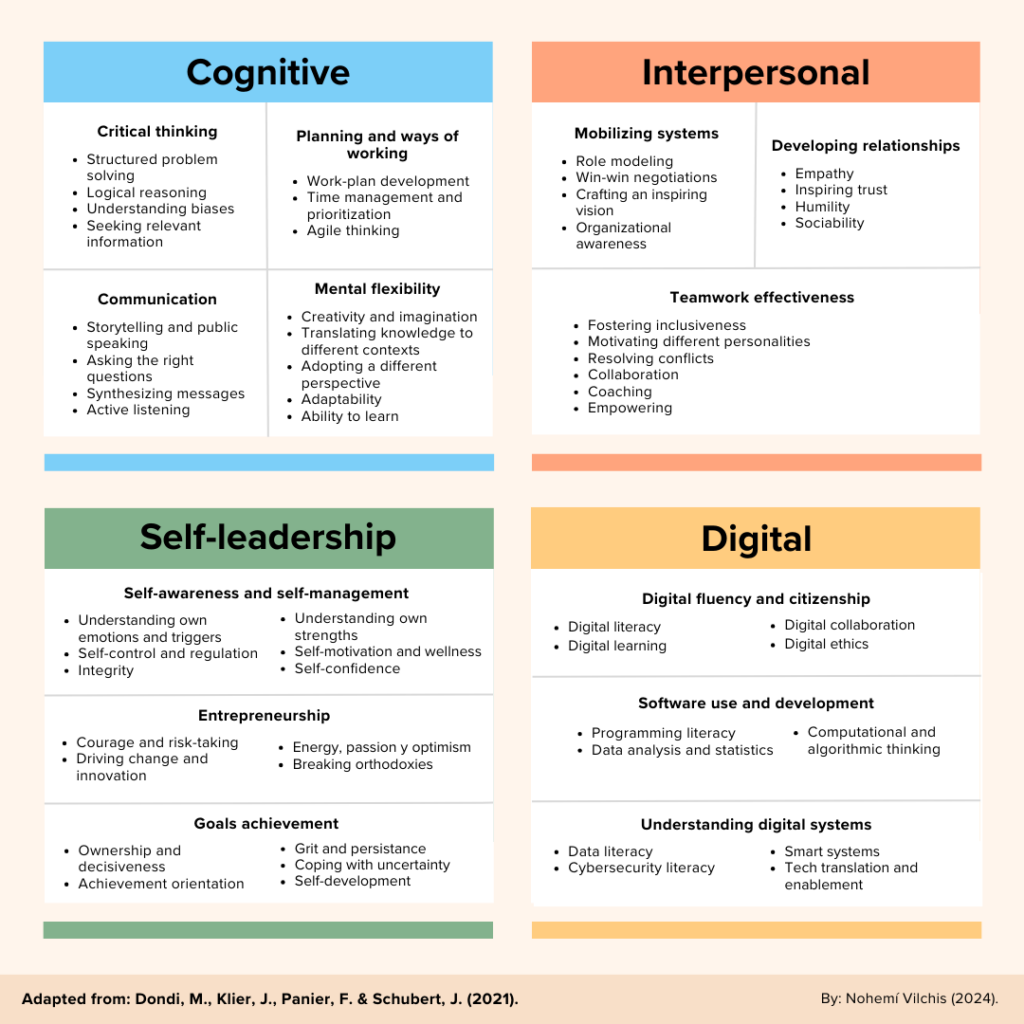Whether you are a student, teacher, or anyone immersed in this interconnected world, you must have particular skills in the future. Today, the impact of Artificial Intelligence (AI) in many industries is increasing rapidly in its many branches, especially with the recent rise of generative AI. Therefore, professionals and students preparing to integrate into the world of work must have demanded skills.
Digital skills are defined as specific knowledge that equips people to practice their professions in digital business environments or ones that are digitalizing. The customers of these organizations have new needs requiring the use of technologies. As journalist Nelly Toche explains, the necessary transversal competencies bring an educational challenge to train professionals throughout life, understanding what is needed in today’s reality.
The global strategic management consultant McKinsey & Company notes that one of every 16 employees will have to change occupations by 2030. This represents more than 100 million workers in the countries investigated in their study (China, France, Germany, India, Japan, Spain, the United Kingdom, and the United States).
Incorporating these skills into the workplace is not new, given that computers, servers, and electronic communications have created demands for personnel in these fields. Thus, the demand for specific skills in the workplace occurs more frequently in the present. Employers expect every organization member to be able to find, evaluate, use, share, and create content using digital devices.
Moving business operations to online platforms has hastened the employers in traditional companies to demand a successful transition by their employees. To stay competitive, they prefer candidates who demonstrate their digital savvy.
Against this backdrop, educational institutions and organizations have reformed and created programs that promote employee training to acquire the skills to perform well in the new positions. One UNESCO report also states that developing educational programs for Artificial Intelligence should be a regular process to address the skills gap while opening dialogue and fostering greater collaboration between industry and the education sector.
Digital Literacy
However, staying current to meet the demands of the digital world would not be possible without the preparation required to address these issues. It is necessary to have literacy in these domains to verify when and how digital resources are needed and the knowledge of their management.
The UNESCO report Artificial Intelligence in Education: Challenges and Opportunities for Sustainable Development states that how AI and education will go hand in hand successfully will be to train teachers and technology developers. Educators must learn new digital skills, considering these resources in a pedagogically appropriate way. Professionals developing Artificial Intelligence need to understand how teachers work to create sustainable solutions in real-life environments.
In addition, the report adds that efforts to prepare the future workforce for AI must include rethinking the content and methods used to deliver instruction at all levels of education.
The report also proposes a global framework to measure digital literacy in seven areas and their respective competencies to provide a basis to train students for the society in which they will live. According to the authors of the report, teachers should prepare their students in:
- Hardware and software fundamentals: It is essential to know how to turn on/off, charge, or lock devices and know user account and password management, logins, and how to set privacy settings.
- Information and data literacy: Students must know about browsing, searching, and filtering data, information, and digital content, as well as analyzing and managing it.
- Communication and collaboration: People need to know how to interact, share, collaborate, and participate as citizens through digital technologies, master socially acceptable rules of conduct on the Internet, and manage their digital identity.
- Creation of digital content: Students must be able to develop and rework digital content, consider copyright and licensing laws, and even know some programming.
- Security: It is vital to manage different areas when protecting your devices, personal data and privacy, well-being, health, and the environment.
- Problem-solving: Knowing how to solve technical problems, identify needs, and create technological responses is critical. Computational thinking will help one to be creative in using technologies.
- Career-related competencies include the knowledge and skills necessary to operate specialized hardware/software in a particular field.
Skills of the not-so-distant future
A few years ago, the 21st-century skills considered necessary were creativity and innovation, critical thinking, problem-solving, decision-making, communication, collaboration, information and media and technology literacy, and citizenship, among others. Although these remain indispensable, the search for acclaimed skills goes beyond what used to be known as basic Information and Communication Technology (ICT) competencies.
According to a document published by the United Nations Educational, Scientific and Cultural Organization and the UNESCO-UNEVOC International Center for Technical and Vocational Education and Training, 82% of jobs that require average skills already require digital skills.
According to the same report, these digital skills serve the critical function of providing access to higher salaries and more significant opportunities for career growth. For example, 78% of jobs have spreadsheet and word processing skills as a minimum requirement.
On the other hand, the University of Nevada, Las Vegas (UNLV) Continuing Education describes that entry-level positions require the minimum digital skills to perform tasks such as:
- E-mail communication.
- Searching for information online.
- Handling sensitive information in virtual ecosystems.
- Using collaborative cloud-based tools like Google Drive, DropBox, and Microsoft Teams.
- Creating and managing spreadsheets and digital documents.
- Basic device management, such as connecting to the internet or installing software updates.
- Screen sharing during video calls.
- Using online calendars to manage various agendas efficiently.
In addition, a study by McKinsey identified 56 core skills that will help citizens thrive in the future of work. These 56 talent elements were called DELTAs; they contain a mix of competencies and attitudes, partitioned into 13 groups and four categories.

According to the consultancy’s research, in a more dynamic and automated labor market, anyone who masters this set of skills will be able to meet the requirements of the following criteria, regardless of their occupation or work sector:
- Adding value beyond what automated systems and intelligent machines can do.
- Operate in a digital environment.
- Constantly adapt to new ways of working and new occupations.
Similarly, journalist Laura Ascione states that digital literacy and coding education will be at the forefront, at least this year, guiding students into the technology-driven future. She adds that learning analytics will be crucial in providing valuable information so teachers can make data-driven decisions.
Likewise, she affirms that cybersecurity education will become more critical for responsible digital citizenship. Above all, she indicates that the main thing will be to guarantee equitable access to technology to bridge the digital divide, the same challenge that implies a commitment by the various educational actors.
So, regardless of your age, educational level, or job title, these skills will be required to perform in any role in the future. It is a great time to learn or relearn what you need to do to get a head start and take advantage of the potential of your talent. What skills would you like to develop? Can you think of another that is also relevant?
Translated by Daniel Wetta
This article from Observatory of the Institute for the Future of Education may be shared under the terms of the license CC BY-NC-SA 4.0 
)
)


)